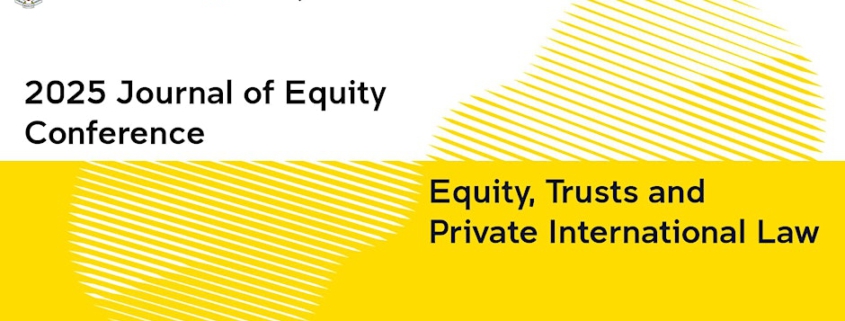Report on the 2025 Journal of Equity Conference – Equity, Trusts and Private International Law
On 21 August 2025, the UNSW School of Private and Commercial Law, the Journal of Equity and Allens jointly hosted the 2025 Journal of Equity Conference. This year’s one-day Conference focused on important questions at the intersection of equity, trusts and private international law. It featured four papers delivered by judges and scholars, each of which was followed by ample time for insightful questions and discussion among over 30 judges, lawyers and scholars attending the office of Allens in (rainy) Sydney.
After the Acknowledgement of Country and welcoming address by Professor Ying Khai Liew (University of Melbourne), The Honourable Andrew Bell (Chief Justice of New South Wales) delivered opening remarks, emphasising the importance of private international law and the application of its rules in equity and trusts in the modern global economy. Drawing references from old and new cases and academic materials, the Chief Justice discussed the tensions among various potential choices of law for equity and trusts, and highlighted the increasingly important role of the question of characterisation when analysing equitable doctrines and remedies.
The first paper by Professor Richard Garnett (University of Melbourne) and The Honourable Andrew Bell focused on the enforcement of trusts in international litigation. Professor Garnett considered private international law principles applied by common law courts to disputes specifically involving trusts with connections to civil law jurisdictions. Drawing from a wealth of judicial decisions, Professor Garnett examined the approaches taken by common law jurisdictions to issues of jurisdiction and applicable law in relation to both express and constructive trusts. The Chief Justice further considered the question of jurisdiction clauses (particularly in Crociani v Crociani [2014] UKPC 40, [2015] WTLR 975) and arbitrability in the enforcement of trusts in private international law. It was noted that there is fertile ground for future cases to develop more sophisticated rules.
The second paper by Professor Tiong Min Yeo (Singapore Management University) considered the problems and approaches in the characterisation of equitable doctrines. Starting with the traditional choice-of-law methodology, Professor Yeo discussed several difficulties when characterising equitable doctrines, most notably that these equitable doctrines often cross doctrinal categories in domestic law and functional categories in choice of law. Taking a functional characterisation perspective of private international law, Professor Yeo suggested looking at how the case is argued and the functions of the doctrine being pleaded. This was illustrated by reference to constructive and resulting trusts, which can fall in either the category of property or the law of obligations, or both, depending on the issue before the court. Multiple cases showed that courts have yet to engage in detail with the question of characterisation.
The third paper by Professor Man Yip (Singapore Management University) looked at the equitable origins and private international law developments of the anti-suit injunction. Professor Yip emphasised the in personam, discretionary nature of the injunction, involving considerations of comity and unconscionability. Professor Yip revealed and discussed various themes of equity within the modern framework of the anti-suit relief, including the different conceptions of comity, the recourse to equitable ideas such as ‘conscience’ (in ‘unconscionable conduct’), and the different bases for the grant of anti-suit relief (equitable jurisdiction vs inherent jurisdiction). The close relationship between equity and comity was further demonstrated by anti-suit injunctions granted in support of foreign litigation or arbitration.
The fourth paper by Associate Professor Adeline Chong (Singapore Management University) investigated the extent of the role of the lex situs in trusts claims. After explaining the rationales for applying the lex situs to questions of property generally, Professor Chong provided an in-depth account of the choice-of-law approach under the Hague Trusts Convention (the HCCH Convention of 1 July 1985 on the Law Applicable to Trusts and on their Recognition) for express trusts, including the situs as a factor in identifying the applicable law of the trust, and the relevance of the lex situs when the applicable law of the trust is not the lex situs, particularly if the lex situs does not recognise trusts or the proprietary aspects of trusts. Professor Chong then turned to common law rules on resulting and constructive trusts, pointing out tensions between applying the lex fori, the lex situs, and the law governing the cause of action, event or obligation. Among these approaches, it was suggested that the lex situs should be accorded a primary role in determining whether a trust can be created in the first place, before other laws – such as those governing the cause of action, event or obligation, or those governing the relationship between the parties – come into play.
Overall, the Conference has provided all attendees with much food for thought. It is evident that these issues have no clear and easy answers, and deserve further judicial and academic attention.
Readers who are interested in the topic may wish to consult, as a starting point, Professor Yeo’s monograph, Choice of Law for Equitable Doctrines (Oxford University Press 2004), as well as various judicial decisions which were frequently featured throughout the Conference, including (in chronological order, and certainly not being an exhaustive list):
- Macmillan Inc v Bishopsgate Investment Trust plc (No 3) [1996] 1 WLR 387 (EWCA);
- Lightning v Lightning Electrical Contractors Ltd (unreported, 23 April 1998) (EWCA);
- Damberg v Damberg (2001) 52 NSWLR 492 (NSWCA);
- Rickshaw Investments Ltd v Nicolai Baron von Uexkull [2007] 1 SLR(R) 377 (SGCA);
- Murakami v Wiryadi (2010) 268 ALR 377 (NSWCA);
- First Laser Ltd v Fujian Enterprises (Holdings) Co Ltd (2012) 15 HKCFAR 569;
- Akers v Samba Financial Group [2017] UKSC 6, [2017] AC 424;
- Trisuryo Garuda Nusa Pte Ltd v SKP Pradiksi (North) Sdn Bhd [2017] 2 SLR 814;
- Xiamen Xinjingdi Group Co Ltd v Eton Properties Ltd [2020] HKCFA 32, (2020) 23 HKCFAR 348; and
- Byers v Saudi National Bank [2023] UKSC 51, [2024] AC 1191.



